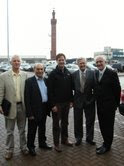Liberal Democrat MP for East Dunbartonshire, Jo Swinson has criticised the Government for raising tax revenue from lower paid workers while failing to tackle bankers' bonuses.
In the House of Commons this week, Jo asked Chancellor Alistair Darling to justify raising National Insurance (NI) contributions for ordinary workers, while levying only an easily-avoidable 10% tax on bankers' bonuses.
In his pre-budget report last week, the Chancellor announced that employees' NI contributions would rise by 0.5%, in addition to the 0.5% announced in April. A 1% increase in NI contributions for employees means that by 2011/12 people earning over £7,000 will pay 32% tax on their income.
Meanwhile, the report shows that the new tax on bankers' bonuses is expected to raise just £500 million from the £5 billion that will be paid in bonuses this year - a total of just 10%. The Liberal Democrats described it as a "gift wrapped invitation to tax avoidance."
Commenting, Jo Swinson said: "The Labour Government has long claimed that it puts fairness at the heart of its policies, but there is nothing fair about Alistair Darling's plans for raising tax revenue. This latest rise in National Insurance contributions will come as bad news to everyone, but most of all to people on lower incomes.
"Meanwhile, the tax on bankers' bonuses is nothing but an empty gesture, as it is very clear that there are many ways in which it can easily be avoided. The tax system is already deeply unfair, and this pre-budget report shows that it is heading further in the wrong direction."
The text of Jo's question to the Chancellor of the Exchequer appears below:
Jo Swinson (East Dunbartonshire) (LD): Will the Chancellor explain how it is fair that after the national insurance rise, people on low incomes will be paying 32 per cent. tax on their income, while he is letting bankers off the hook with a tax that will be easy to avoid, is full of holes and will raise just 10 per cent. of the £5 billion expected to be paid in bank bonuses this year?
Mr. Darling: In relation to the bank payroll tax, we are trying to change the behaviour of some banks that still want to pay out very large sums in bonuses when we believe that the money would be better applied to building up their capital position. Of course, from next April, people earning more than £150,000 a year-that will include many recipients of these bonuses-will pay tax at the top rate of 50p. In addition, the hon. Lady asked about national insurance. I made the position clear last week. In particular, I made the point that people earning less than £20,000 would not be paying more as a result of the measures that I introduced.
Friday, 18 December 2009
Subscribe to:
Post Comments (Atom)







No comments:
Post a Comment